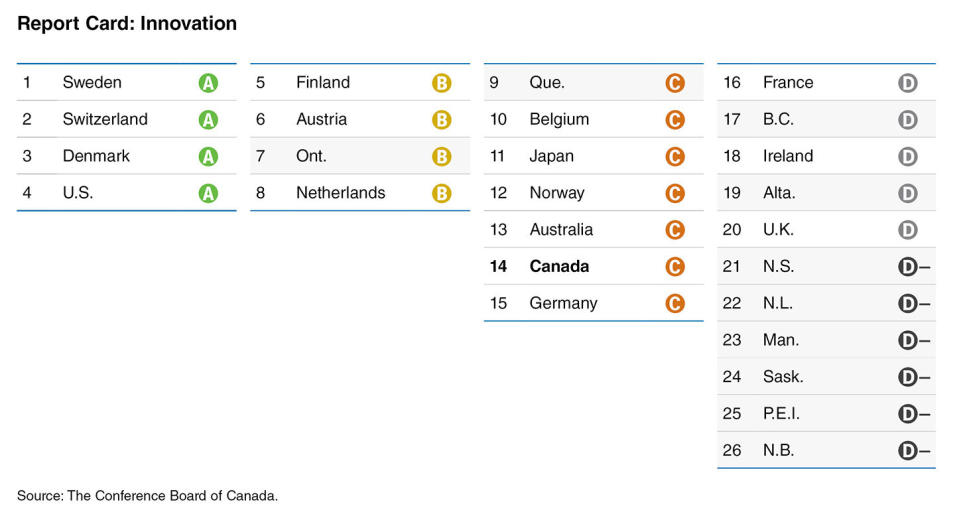Canada slips in global innovation rankings

Canada has been touted as a hotbed of innovation and ingenuity, but it appears we aren’t keeping up with other regions. And the maritime provinces are fairing the worst in the country.
The Conference Board of Canada released its annual innovation performance report card, and Canada got a ‘C’ grade. Out of 16 countries, Canada ranked 12th, falling from ninth from the previous year.
While the country has seen improvements in venture capital investment and entrepreneurial ambition, it still does not see enough investment in Information & Communication Technology (ICT), patents, business research and development, or productivity.
“Canada once again faces the reality of its low innovation performance, falling in the Conference Board’s innovation ranking as key international competitors surge ahead,” said Paul Preston, Director of Science, Technology and Innovation Policy of The Conference Board of Canada in a press release. Australia, Belgium and Japan were all countries that saw an improvement in their ranking, overtaking Canada.

The ranking also included grades for each of the provinces. Ontario and Quebec are the top rated provinces with “B” and “C” grades respectively, while Prince Edward Island and New Brunswick rank lowest, both scoring “D” grades.
Barry Bisson, CEO of New Brunswick-based startup accelerator Propel ICT, says there are several key problems that are preventing the Maritimes from becoming an innovative force in this country, and globally.
“One of the challenges is geography,” says Bisson. “It’s not easy to move around, it’s very costly. We also lack density in most jurisdictions. Having lived in Waterloo for 12 years, I saw the advantages of having a significant population in a small geographic area. With the exception of Halifax, we just don’t have critical mass most of the time, and have challenges serving areas in the way they need to be served.”
Bisson says his organization has run into issues where an entrepreneur has a brilliant idea, but due to them being the lone innovator seeking support in their region, Propel ICT isn’t able to justify setting up an accelerator in that community.
“A lot of communities where you may have a promising entrepreneur with a promising idea, they wouldn’t have the [population] density,” says Bisson.
He adds that innovators in Atlantic Canada, and Canada as a whole, need to learn to embrace the business and sales side of the invention game.
“In Finland, they’ve created these universities of applied sciences, to more easily build ties between engineers, scientists and the private sector,” says Bisson. While he agrees that it makes sense for traditional universities to keep at arm’s length from the private sector, decoupling the applied sciences to take advantage of partnerships with the private sector has proven extremely successful. Finland ranks fifth on the Conference Board’s report card.
“Really, our founders and CEOs should be the top sales people in those organizations,” says Bisson. “We need to make sales more of a professional discipline instead of this misconception that it’s a sleazy occupation.”
The Atlantic advantage
One of the greatest assets the region possesses is the number of institutions working on creating those innovators.
“We have 14 universities and five community colleges in the region for a population the size of Montreal,” says Bisson. “We’re a really well endowed region.”
But the challenge is engaging the people who come out of those schools with innovative ideas and helping them see them through.
“Wee need to build a better partnership between universities and our ecosystem so these brilliant young minds who get bitten by the entrepreneurial bug in university have somewhere to go with their idea instead of leaving the region.”
Bisson says that during his previous career as an engineer, working in the Waterloo region and across Canada, he encountered Maritimers everywhere he went, showing that there are innovators in the region, they just aren’t staying there.
Part of Bisson’s past life was also spent as the head of the SHAD program in Ontario, which hosts high school students at university campuses across the country. The program challenges students to solve some of their communities’ and the world’s biggest problems, and teaches them the foundation for founding their own startups to make their ideas reality.
“Being surrounded by these really brilliant young people, you just see so much potential,” says Bisosn. “But I’m not sure we did did a really good job of stitching them into the innovation ecosystem and promoting innovation and entrepreneurship as a career.”
To help push more young people into the world of startups and innovation, Bisson suggests modeling it after what we know really does work in Canada: hockey.
“I always think about minor hockey in Canada,” says Bisson. “If you look at the programs and resources to get young boys and girls to embrace hockey in Canada — I’ve always thought gee, if we could do something similar on the innovation side…
“Why couldn’t we take that model and have more of a grassroots initiative in our country to develop this kind of culture and make young people realize the importance of innovation to solve the huge problems we face on our planet.”

 Yahoo Finance
Yahoo Finance 
